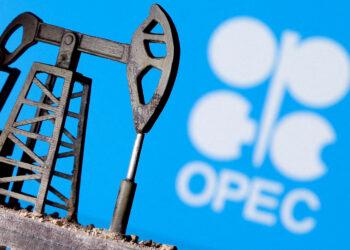The Central Bank of Nigeria (CBN) was criticized for running multiple exchange rate regimes, but the reasons are more obvious and straightforward than the discourse suggests.
In the absence of a diversified export base, foreign exchange receipts have been limited, exacerbated by domestic infrastructural bottlenecks and security challenges, which continue to affect crude oil production.
This has prevented the country from meeting the OPEC-set quota and benefiting from high global oil prices brought on by the Russia-Ukraine war and, more recently, the war in Gaza, worsening accretion to foreign exchange reserves.
Summarily, scarce foreign exchange reserves necessitated measures such as multiple exchange rate practices and foreign exchange rationing to conserve depleting reserves and ameliorate demand pressure in the foreign exchange market.
The resulting speculative activity and roundtripping in the market is a clear case of well-intentioned policies yielding unintended and negative consequences.
Nigeria has relied on short-term policies to attract short-term foreign capital. Typically, interest rates are the means through which this is achieved.
As a result, hot money – that is, money coming onshore for quick interest rate gains in the financial markets and exiting almost immediately, has crowded out long-term foreign capital.
Regrettably, the decision to raise the interest rate has not had the desired impact of attracting sufficient capital inflow to stabilize the foreign exchange market. It has also failed to moderate the escalating levels of inflation in the country.
This suggests that deeper underlying issues need to be addressed and that the responsibility of tackling these issues falls primarily on the fiscal authority rather than the monetary authority.
The scarcity of foreign exchange led the monetary authority to be innovative in sourcing foreign exchange in place of foreign exchange from trade receipts. Some innovations include the naira4dollar scheme and RT200 programme (race to $200 billion) implemented in 2021 and 2022, respectively.
The central bank has continued to manage foreign exchange supply and demand pressure to stabilize the market. The circulars released in January 2024 removed the allowable limit on exchange rates quoted by International Money Transfer Operators (IMTOs) and the requirement that banks’ Net Open Position (NOP) of foreign currency assets do not exceed 20 per cent short or 0 per cent long of shareholder’s funds exemplify this.
Additionally, forex scarcity has also led to the central bank’s development focus. In recent times, we have seen central banks around the world take on a more developmental role, for example, carrying the burden of financial inclusion through the acceptance and adaptation to the rise of financial technology (FinTech).
For instance, Kenya’s central bank created a regulatory environment for mobile payment services to thrive, Nigeria designed and implemented a financial inclusion vision on the back of payments system innovation, and Pakistan established a credit agricultural guarantee scheme (Nigeria also did the same).
Central banks’ emphasis on development is not an entirely new idea. The Bank of England and the Federal Reserve directly supported economic development policies in the early days of industrialization, and the Bank of Korea did the same in the 1950s.
So, the developmental role of the central bank is not in contention, but the seemingly long-term open-ended intervention witnessed in Nigeria, particularly.
The central bank’s role in development in the West and parts of East Asia was targeted and finite and involved concerted fiscal and monetary policy coordination.
With over ten development-oriented ministries under the fiscal authority, including Trade & Investment, Agriculture, Science & Technology, Budget and Economic Planning (Social Development), Power, Aviation, Housing & Urban Development, Solid Minerals, and more, prolonged central bank intervention in development is unwarranted, save for a fiscal vacuum.
Import dependence and monetary policy dominance signal a breakdown in responsibility. The democratic contract holds that in exchange for votes, elected officials will provide a suite of public goods. The means through which the government finances domestic development are taxation and receipts from foreign trade.
Without a vibrant tax base, trade, particularly exports, provides the funding to make good on the democratic promise. It is a cycle. Becoming export-oriented requires policies that entrench private sector growth – that is, globally competitive firm production, which, in turn, creates a taxable base that reinforces the democratic contract.
Moreover, the central bank is, in simplistic terms, a bank to the government. It should be concerned with managing deposits made by the central government. By this measure, the responsibility of ensuring foreign reserve accretion falls on the shoulders of the fiscal authority. International trade is the most viable way to earn foreign exchange.
China’s recent economic triumph of moving over 300 million people into the middle class, like other countries in the past, rested on trade, particularly exports. So, finger-wagging the central bank is misplaced, although understandable, seeing as the central bank engaged in development policy without necessarily having or communicating an exit strategy.
The fiscal authority can and should use the banking system through the central bank to mobilize capital for industrialization as there is historical precedence for galvanizing financial sector resources to fuel an industrial export-oriented policy.
For example, in the 19th century, France, a late industrializer, invented the crédit mobilier to finance long-term development through infrastructure. However, the burden should not rest solely on the monetary authority. There should be fiscal and monetary policy coordination to achieve economic development.
If industrial policy rings protectionist, then we must recall that we are in the age of anti-globalization, and the revolutionary US Inflation Reduction Act (IRA) – a federally subsidized re-industrialization policy to green the US economy and reduce its reliance on Chinese raw materials in making semi-conductors and solar infrastructure, offers a great opportunity.
Like the Norwegian battery company Freyr, moving its manufacturing to the US to benefit from the IRA funding, the fiscal authority should make Nigeria an export hub by promoting brownfield and greenfield long-term infrastructure-based investments to help meet its foreign exchange needs and refrain from relying on the central bank to source foreign exchange to stabilize the market.























